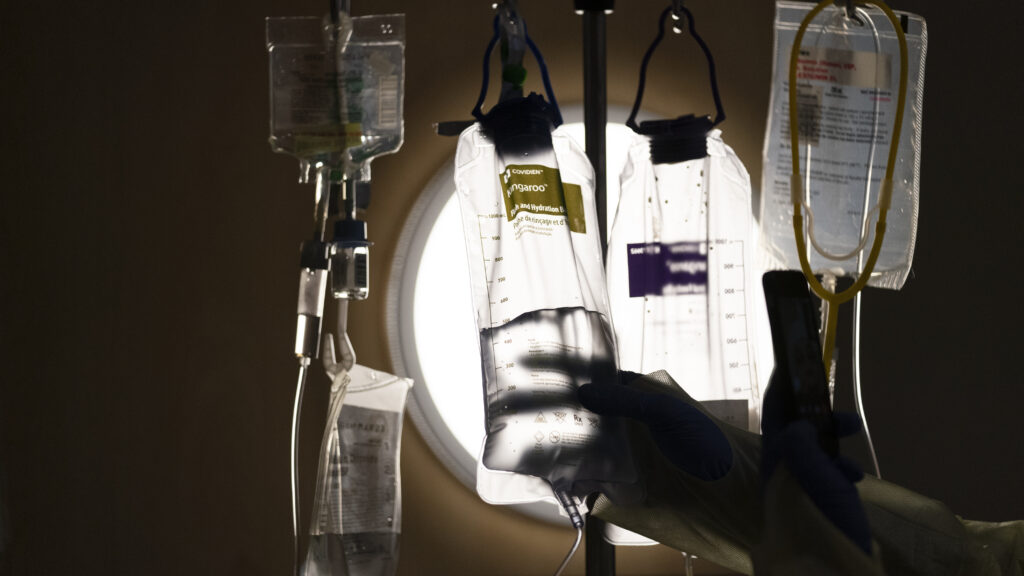In 2017, at the age of 42, Susan Whitehead was diagnosed with an early form of breast cancer after discovering a lump in her breast. She embarked on a challenging path of treatment, including a recurrence with stage 2 cancer four years later.
Susan underwent two lumpectomies, a mastectomy, radiation, and chemotherapy. Throughout this process, she was steadfast in her resolve to seek the best possible care, which included demanding a controversial full-body scan that led to an unexpected discovery: She also had thyroid cancer.
advertisement
The diagnosis marked the beginning of a journey that would not only test her resilience, but also lead to a shocking discovery about the potential risks associated with IVs used to administer chemotherapy: The plastic used to make the bags and tubing often contain a toxic chemical known as DEHP.
Ninety percent of medical patients in the U.S. receive IV therapy, and approximately 70% of IV bags and tubes contain this chemical — despite known links to breast, liver, lung, and testicular cancers. Because it’s not a stable molecule, DEHP leaches out of the plastic bags into the medication and other fluids being infused into the bloodstream of patients, posing a major health risk to already vulnerable populations.
For cancer patients in particular, toxic IV bags and tubing represent an extremely serious public health concern: DEHP promotes drug resistance and interferes with chemotherapy’s ability to fight breast cancer, making cancer cells “immortal”. Research also shows that patients with higher levels of DEHP in their system had higher rates of relapse and breast cancer mortality. This is especially frightening for the over 300,000 women each year who are battling breast cancer in the United States.
advertisement
Susan will never know if DEHP contributed to her thyroid cancer, but there is evidence to suggest it’s possible.
For the past 30 years, Breast Cancer Prevention Partners, where I am board chair, has been working to eliminate known risk factors linked to various forms of cancer, like talc in baby powder and BPA in plastic. But this particular risk, DEHP in IV devices, is especially egregious because it’s a cancer-causing chemical that’s widely present in cancer treatments — despite the fact that safer, affordable solutions exist and are readily available.
DEHP is known to cause harm at very low doses. The U.S. Environmental Protection Agency’s standards establish the reference dose (RfD) for DEHP at only 0.02 mg/kg/day, the level of daily exposure that is not expected to have dangerous consequences over a lifetime. But one study found patients, including preterm neonates, can be exposed to DEHP through infusion lines at levels ranging from 10 to 20 mg per day.
This is especially dangerous for infants, who may receive an IV in the NICU, for example. According to a study by researchers at Johns Hopkins, daily exposure to DEHP for critically ill preterm infants can reach 16 mg/kg per day, mostly from blood products and endotrachael tubes placed in the airway to provide breathing support. This is 4,000 times higher than levels desired to prevent a type of male reproductive toxicity, and 160,000 times higher than levels desired to prevent liver injury.
This harmful exposure during such a critical period in someone’s life is entirely avoidable.
Thankfully, the California State Legislature recently passed new, first-of-its-kind legislation in a bipartisan effort that will ban DEHP from IV bags and tubing with the goal of transforming the industry nationwide. (In the State Senate, the vote was unanimous.) The California Toxic-Free Medical Devices Act, which the governor is expected to sign into law soon, bans DEHP—and its replacement with other chemicals in the same class of ortho-phthalates—from IV bags and tubing manufactured, sold, or used in California by 2030 for IV bags and 2035 for IV tubing.
advertisement
For nearly 20 years, the American Academy of Pediatrics, the American Medical Association, the American Public Health Association, and the Food and Drug Administration have all urged hospitals and physicians to phase out medical devices containing DEHP, which has been banned from toys on a national level since 2008 and from beauty and personal care products sold in California since 2020. The fact that DEHP is not allowed in children’s toys because it’s too toxic for children to suck on, but we allow it to be pumped into people’s veins — from newborns to cancer patients — makes no sense.
The bottom line is that DEHP has no place in medical devices, especially when safer alternatives exist. According to an analysis of industry data conducted by B. Braun Medical Inc., which makes DEHP-free alternatives, approximately 70% of the IV bags used in the U.S. are made from DEHP. The large majority of those IV bags are supplied by one global corporation, Baxter. In California and the U.S., there are comparably priced, nontoxic IV bags and tubing widely available today. Kaiser Permanente saved $5 million in annual costs when they switched to DEHP-free IV bags and tubing. Three of the four major manufacturers already have a large portfolio of FDA-approved DEHP-free IV bags, including B. Braun, Fresenius-Kabi, and ICU Medical.
Leading health systems, like Kaiser Permanente, Loma Linda University Health, and City of Hope, switched to toxic-free IV bags years ago, and proved that the transition doesn’t have to be an expensive, multiyear process. In fact, Kaiser Permanente converted its entire hospital system to DEHP-free IV bags and tubing in six months over a decade ago. What is taking everyone else so long? Breast Cancer Prevention Partners is calling on hospitals to sign this pledge to phase out these toxic chemicals as soon as possible.
California’s imminent legislation banning DEHP in IV bags and tubing is a huge step in the right direction. But whether or not it’s mandated by law, health care systems nationwide should do better by their patients and transition away from this toxic chemical immediately.
advertisement
Dr. Lisa Bailey is a former breast cancer surgeon and board chair of Breast Cancer Prevention Partners.

